Divine right of kings - Study guides, Class notes & Summaries
Looking for the best study guides, study notes and summaries about Divine right of kings? On this page you'll find 460 study documents about Divine right of kings.
Page 3 out of 460 results
Sort by
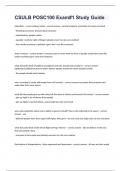
-
CSULB POSC100 Exam#1 Study Guide 2024/2025 passed
- Exam (elaborations) • 10 pages • 2024
-
Available in package deal
-
- $17.99
- + learn more
CSULB POSC100 Exam#1 Study GuideLiberalism - 5 core Lockean Values - correct answer - private property: protection of money and land - limited government: prevent abuse of power - individualism: people matter - equality: no divine right of Kings (nobody is born to rule over another) - free-market economy: capitalism (gov't don’t run the economy) state of nature - correct answer a concept used to show what the lives of people would have been like before societies/gov't came into exist...
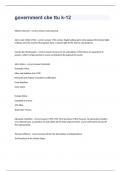
-
government cbe ttu k-12 questions and answers graded A+
- Exam (elaborations) • 8 pages • 2024
- Available in package deal
-
- $12.99
- + learn more
government cbe ttu k-12William Hancock - correct answer Union general John Locke () - correct answer 17th century English philosopher who opposed the Divine Right of Kings and who asserted that people have a natural right to life, liberty, and property. Charles de Montesquieu - correct answer famous for his articulation of the theory of separation of powers, which is implemented in many constitutions throughout the world. John Adams - correct answer Federalist Domestic Policy: Alien a...
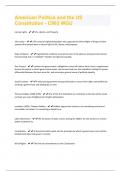
-
American Politics and the US Constitution - C963 WGU Questions and Answers(A+ Solution guide)
- Exam (elaborations) • 66 pages • 2023
- Available in package deal
-
- $16.99
- + learn more
natrual rights - Life, Liberty, and Property John Locke - 17th century English philosopher who opposed the Divine Right of Kings and who asserted that people have a natural right to life, liberty, and property. State of Nature - Hypothetical condition assumed to exist in the absence of government where human beings live in "complete" freedom and general equality. Due Process - involves the government's obligation to treat all citizens fairly. Such a requirement lessens the extent to whi...
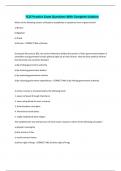
-
FCLE Practice Exam Questions With Complete Solution
- Exam (elaborations) • 14 pages • 2024
- Available in package deal
-
- $17.49
- + learn more
FCLE Practice Exam Questions With Complete Solution Which of the following ancient civilizations established a republican form of government? a) Roman b) Egyptian c) Greek d) Persian - CORRECT ANS-a) Roman During the 6th century BCE, the ancient Athenians divided the powers of their government between 2 assemblies and guaranteed certain political rights to all male citizens. How do these political reforms best illustrate how societies develop? a) by limiting government authority b) b...
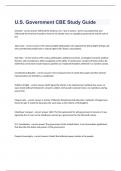
-
U.S. Government CBE Study Guide questions and answers graded A+
- Exam (elaborations) • 11 pages • 2024
- Available in package deal
-
- $15.49
- + learn more
U.S. Government CBE Study GuideAristotle - correct answer Affirmed the existence of a "law of nature," but he was admired by and influenced the American Founders more for his related views on republican government and the rule of law. John Locke - correct answer 17th century English philosopher who opposed the Divine Right of Kings and who asserted that people have a natural right to life, liberty, and property. Karl Marx - correct answer 19th century philosopher, political economist, so...
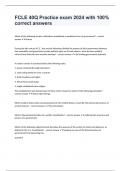
-
FCLE 40Q Practice exam 2024 with 100% correct answers
- Exam (elaborations) • 7 pages • 2024
-
- $17.49
- + learn more
Which of the following ancient civilizations established a republican form of government? - correct answer Roman During the 6th century B.C.E., the ancient Athenians divided the powers of their government between two assemblies and guaranteed certain political rights to all male citizens. How do these political reforms best illustrate how societies develop? - correct answer by limiting government authority A certain country is characterized by the following traits: 1. power achieved throu...
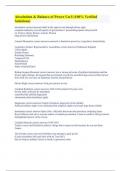
-
Absolutism & Balance of Power Un.5 (100% Verified Solutions)
- Exam (elaborations) • 13 pages • 2023
-
Available in package deal
-
- $11.79
- + learn more
absolutism correct answers belief in the right to rule through divine right complete authority over all aspects of government 1 person/king/queen=all powerful ex: France, Spain, Russia, Austria, Prussia king>power>parliament Limited Monarchy correct answers monarch is limited in power by a legislative branch/body Legislative bodies/ Representative Assemblies correct answers Parliament:England Cortes:Spain Estates:France Reichstag:Germany Congress:USA Duma:Russia Sejm:Poland...
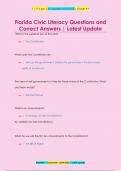
-
Florida Civics Literacy Questions and Correct Answers | Latest Update
- Exam (elaborations) • 19 pages • 2024
- Available in package deal
-
- $13.79
- + learn more
Which of the following ancient civilizations established a republican form of government? A. Roman B. Egyptian C. Greek D. Persian → ::- A During the 6th century B.C.E., the ancient Athenians divided the powers of their government between two assemblies and guaranteed certain political rights to all male citizens. How do these political reforms best illustrate how societies develop? A. by limiting government authority B. by choosing government leaders C. by improving gover...
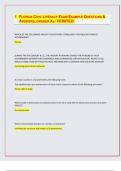
-
1 FLORIDA CIVIC LITERACY EXAM EXAMPLE QUESTIONS & ANSWERS, G| LATEST UPDATES/ COMPLETE EXAM PREDICTION PAPER |RADED A+/ VERIFIED/
- Exam (elaborations) • 9 pages • 2024
-
Available in package deal
-
- $7.99
- + learn more
1 FLORIDA CIVIC LITERACY EXAM EXAMPLE QUESTIONS & ANSWERS, GRADED A+/ VERIFIED/ WHICH OF THE FOLLOWING ANCIENT CIVILIZATIONS ESTABLISHED A REPUBLICAN FORM OF GOVERNMENT? Roman DURING THE 6TH CENTURY B.C.E., THE ANCIENT ATHENIANS DIVIDED THE POWERS OF THEIR GOVERNMENT BETWEEN TWO ASSEMBLIES AND GUARANTEED CERTAIN POLITICAL RIGHTS TO ALL MALE CITIZENS. HOW DO THESE POLITICAL REFORMS BEST ILLUSTRATE HOW SOCIETIES DEVELOP? by limiting government authority A certain country is characteriz...
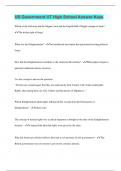
-
US Government UT High School Answer Keys | Questions with 100% Correct Answers | Latest Update 2024 | Verified
- Exam (elaborations) • 23 pages • 2024
-
- $9.99
- + learn more
US Government UT High School Answer Keys | Questions with 100% Correct Answers | Latest Update 2024 | Verified Which of the following did the Magna Carta and the English Bill of Rights attempt to limit? - The divine right of kings What was the Enlightenment? - An intellectual movement that questioned existing political forms. How did the Enlightenment contribute to the American Revolution? - Philosophers began to question traditional notions of power. Use the excerpt to answer the quest...

How much did you already spend on Stuvia? Imagine there are plenty more of you out there paying for study notes, but this time YOU are the seller. Ka-ching! Discover all about earning on Stuvia


